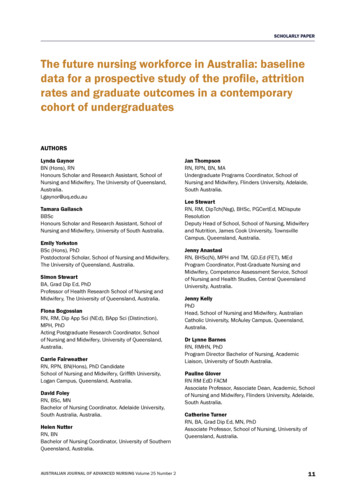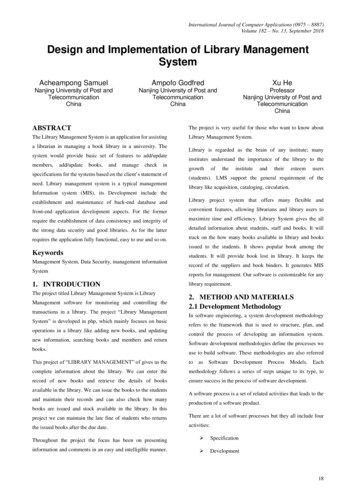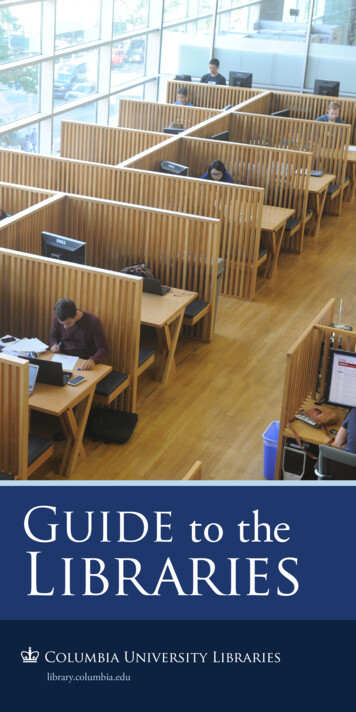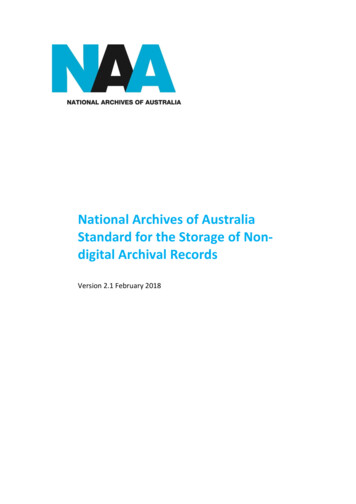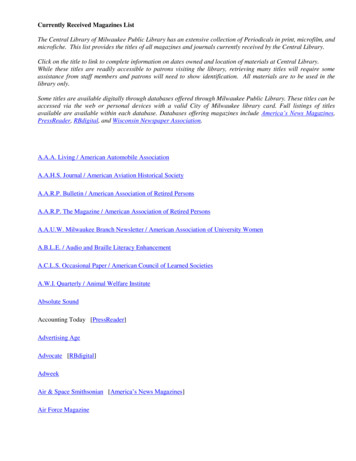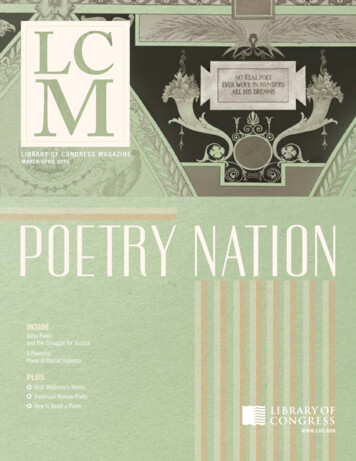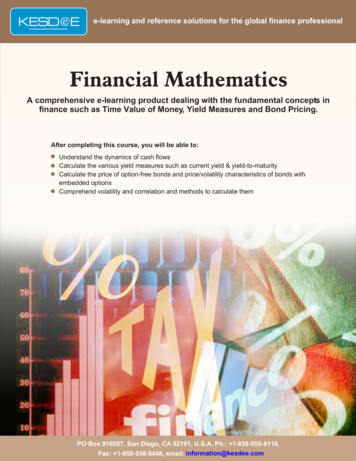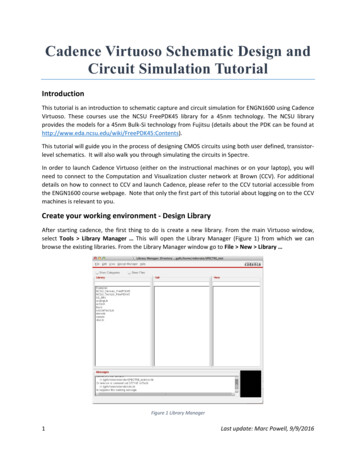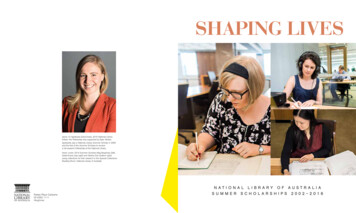
Transcription
SHAPING LIVESabove: Dr Agnieszka Sobocinska, 2016 National LibraryFellow. Her Fellowship was supported by Ryan Stokes.Agnieszka was a National Library Summer Scholar in 2006and the first of the Summer Scholars to receivea full research Fellowship at the National Library.front cover: 2016 Summer Scholars Meg Brayshaw (left),Gretel Evans (top right) and Talisha Goh (bottom right)using collections for their research in the Special CollectionsReading Room, National Library of AustraliaParkes Place Canberra02 6262 1111nla.gov.auN AT I O N A L L I B R A RY O F AU ST R A L I ASUMMER SCHOLARSHIPS 2002–2016
N AT I O N A LLIBRARYOFAUSTRALIASUMMERSCHOLARSHIPSthe Summer Scholarship exposed me to adifferent side of Australia: engaged with ourculture, alive to possibilities, curious aboutthe past and always looking for our potential.D unya Lindsey, National Library Summer Scholar 2006In 2001, then National Library Council member NormanMcCann expressed a desire, together with his wife Pat,to offer a gift that would enable young people to engagemore deeply with the Library, to undertake research andfulfil their aspirations. It was from this visionary ideal thatthe Summer Scholarships program was born, and has sinceflourished and been sustained by the generosity of donors.This publication celebrates 15 years of this remarkablescheme, which, from 2002 to 2016, has supported53 young Australian scholars to enjoy six weeks ofimmersive research at the Library, on the research topicof their postgraduate thesis. Many have since continued tovisit and use the Library and value the lasting friendshipsmade with other scholars and Library staff, forged throughtheir Summer Scholarship experience.More than this, the publication honours the achievementsof the Summer Scholars and the diverse ways in whichtheir experience at the Library helped inspire, shape andinform their research, writing, career paths and life directions.Norman, who sadly died suddenly soon after meetingthe first group of Summer Scholars in 2002, would havedelighted in their formidable accomplishments. True to hisoriginal intent, they have shown themselves to be, in thewords of 2006 Summer Scholar Dunya Lindsey, ‘engagedwith our culture, alive to possibilities, curious about the pastand always looking for our potential’.The Summer Scholars have participated in the creation ofthis booklet, just as they have created new knowledge fromdiverse collections and research interests. They have told usthe paths they have taken, reflected on how the SummerScholarships helped shape their thinking and lives, andshared delightful and inspiring stories.The diversity of their careers and contributions is asastonishing as their achievements. Some now havestellar academic careers, nationally and internationally,and have published prodigiously. Others have transformedthemselves and applied their skills and knowledge tonew roles, including national and state governmentpolicy-making. Many Summer Scholars balance workinglife with parenthood. They have lived and worked overseas,volunteered in diverse communities of need, or becomecreative writers, social researchers, artists, curators, teachersand librarians. Recent Summer Scholars are still completingtheir research, abuzz with the immediacy of their new-foundknowledge and their Canberra experience, and enriched bytheir encounters at other national cultural institutions, theAustralian National University and the Australian parliament.There are some patterns to the Summer Scholars’reflections: the opportunity was life-shaping, life-changingor a springboard to other opportunities; the commitment anddepth of knowledge of Library staff was inspirational; thecollections provided abundant riches and research ideas foryears to come; and new-found confidence was enhancedthrough a community of peers and meaningful friendships.The Summer Scholars have become wonderfulambassadors for the Library and the program. They all joinwith the Library in thanking the donors: Pat McCann andher family for sustaining Norman’s vision for over 15 years,John and Heather Seymour for taking up the baton from2008, and two anonymous donors who enabled additionalSummer Scholarships to be offered on occasions.1
N AT I O N A L2002Sally Young Andrew Greenwood Joanna na: It was an honour to be one of the inaugural SummerScholars and a privilege to be able to take full advantage of theLibrary’s wonderful collections. I was mentored and supported byLibrary staff and given behind-the-scenes access to a wealth ofinformation. I especially enjoyed meeting Norman McCann andCouncil members. We Scholars developed strong friendshipsand have supported each other through finishing our PhDs,finding employment and becoming parents!Associate Professor Sally YoungTHEN: Sally examined how political advertising and communicationhas changed over time, using federal election campaign ephemera:badges, buttons, posters, pamphlets, handbills and archived websites.NOW: Sally is associate professor and reader in political science andan Australian Research Council (ARC) Future Fellow at the University ofMelbourne. She is a regular public commentator on Australian politics,elections and the media, and has published extensively in the fieldrelated to her original research at the Library.Dr Andrew GreenwoodSally: I was fortunate to be in thefirst group of Summer Scholars andto have met with Norman McCann.It turned out to be a life-shapingexperience and a great basis fora research career. It sparked myinterest in historical materials—andI have been able to follow throughwith that passion, writing four booksand creating a research group thathas contributed 60 oral histories tothe Library’s collection.2Andrew: My experiencewas highly enriching and centralto my scholarly development.The Summer Scholarship affordedme a valuable opportunity to workwith archival sources in Australianmusic and I expect to return, in thefuture, to some of these collectionsrelated to my original work as aSummer Scholar.THEN: Andrew examined the Australian Musical Albums, 1854–1863,containing beautifully illustrated sheet music, to consider theimportance of music publishing in shaping Australian colonial andsocial identity.NOW: Andrew completed his master’s at the University of Sydney, thenhis PhD in musicology, with research scholarships at the University ofChicago where he also taught. Following a visiting lectureship at theSouthern Methodist University, in 2014 he was appointed assistantprofessor of musicology at the Southern Illinois University, Edwardsville.Dr Joanna RichardsonTHEN: Joanna traced hidden archival sources, such as the 1840account book of a ‘Mrs Deane’ in Manuscripts, to explore the privatevoices and domestic activities of unknown women in Australian history.NOW: Following a PhD editing colonial diaries, Joanna moved toTexas in 2007 to undertake postdoctoral studies, but shifted careersinto research coordination in the Department of Genetics, SouthwestFoundation for Biomedical Research, Texas. In 2015, she returned tothe discipline of English as a lecturer at the University of Tasmania.3
N AT I O N A L2003Ruth Nicholls Joanne Archer Sarah IrvingLIBRARYOFAUSTRALIASUMMERSCHOLARSHIPSSarah: The Summer Scholarshiphad a lasting impact upon me. Onreturning from the United States,I reawakened my interest in theLibrary’s collections. I rememberfondly those days, ten years earlier,when I would walk the same routethrough the grand foyer and thereading room. My husband and Inow look forward to making theNational Library a meaningful placefor our young girls, who love booksand stories about our past.Dr Ruth NichollsTHEN: Ruth examined Indigenous leadership and communitydevelopment through researching an oral history collection, ‘SevenYears On: Continuing Life Stories of Aboriginal Leaders’.NOW: Ruth works in Aboriginal and Torres Strait health policy for theCommonwealth Government, and in 2014 co-authored the Aboriginaland Torres Strait Health Performance Framework for the Department ofPrime Minister and Cabinet. She honed her research skills and interestsworking at the Australian National University (ANU), the AustralianInstitute for Aboriginal and Torres Strait Islander Studies and theWestern Sydney University.Joanne ArcherJoanne: The Summer ScholarshipRuth: The Summer Scholarship wasan experience that really assisted mein developing my ideas and interestsand laid a foundation for my futureresearch. Building on my interest in oralhistory, I developed a strong focus onqualitative methodology and questionsof ethical engagement with Indigenouscommunities to develop an evidencebased research practice as applied topolicymaking. I also valued the insightsgained ‘behind the scenes’ at the Library.4allowed me to conduct historical researchthat was impossible in the United Statesand exposed me to the cutting-edge workof the National Library. This second aspectof my time at the Library has turned out tobe particularly important, as I embarked ona career in librarianship. The Library is trulya leader worldwide and I am grateful for mybehind-the-scenes experience.THEN: Joanne studied the immigrant experience in South Australiaunder the Wakefield Immigration Scheme, 1830–1850, using tractsand pamphlets, diaries and letters, parliamentary papers, shipping listsand other records.NOW: Joanne is head of Access & Outreach Services for SpecialCollections and University Archives, University of Maryland, Baltimore.Inspired by her Scholarship experience, Joanne pursued librarianship,first as a project archivist, then from 2005 as a curator of archival andrare book collections, curating exhibits, creating digital collections andteaching collections research.Dr Sarah Irving-Stonebraker (nee Irving)THEN: Sarah explored the lost tradition of political idealism and activecitizenship in Australian republicanism in the 1890s, using radicalnewspapers, political pamphlets, poetry, literature and cartoons.NOW: Sarah is senior lecturer in modern European history at theWestern Sydney University. She was previously a junior research fellowat Wolfson College, Oxford University, then assistant professor of religionat Florida State University. She completed her PhD at CambridgeUniversity and won a Royal Society for Literature award for her bookon natural science and the origins of empire.5
N AT I O N A L2004LIBRARYOFAUSTRALIASUMMERSCHOLARSHIPSRachel: I have very fond memories of my time as a SummerSarah Olive Meredith Lake Rachel SandersonScholar. I now work part time, care for my young son and writefiction, and I love to write in the Library when I am able. I am sograteful for the experience offered by the Summer Scholarshipand the support and encouragement of the wonderful staff.I feel this generous program began a lifelong connection withthis institution.Dr Sarah OliveTHEN: Through a close reading of menus held in manuscript, picturesand ephemera collections, Sarah explored the function of the menu inAustralia, from its literal use to its emotional value.NOW: Sarah is a lecturer in Shakespeare education, University of York.After a master’s degree in educational research at Queens’ College,Cambridge, she completed her PhD at the University of Birmingham onthe value of Shakespeare in twentieth-century English education andwas a research intern at Shakespeare’s Globe Theatre.Dr Meredith LakeSarah: Although my research interests arediverse—from food to literature to education—thereare continuities in my research methods andsources with the work I undertook at the NationalLibrary: learning to use archival materials andanalytical approaches to cultural criticism.Moreover, the experience and expertise gainedfrom working with staff and fellow Scholars isexcellent preparation for collaboration in researchand academic settings generally—as well as beinga pleasure in itself.6Meredith: I am indebted tothe McCann Summer Scholarprogram for it gave me an invaluableexperience of full-time researchwork and helped me familiarisemyself with the Library in general, aswell as with particular manuscriptcollections that I have come backto on many subsequent occasions.My Library research led directlyto many academic publicationsthat have assisted me in gainingemployment as a historian.THEN: Meredith explored the dynamics of Christian participation inAustralia’s ‘first Aboriginal race riot’ in Brisbane, 1971, using archivalrecords of the Australian Council of Churches and personal papers.NOW: Meredith is a historian of religion, balancing her research withcaring for her children and her blog, Faith and Place. Her latest bookis The Bible Down Under, and follows other major publications onthe history of Australian Christianity relating to health and aged care,evangelical student movements, Protestantism, mission and thecolonisation of Australia.Dr Rachel SandersonTHEN: Rachel used oral history and manuscripts to examine thecontroversy that erupted in 1983 over the construction of a roadthrough the Daintree rainforest at Cape Tribulation National Park,North Queensland.NOW: Rachel is an environmental historian who works for theCommonwealth Department of Environment and Energy. She hastransferred her award-winning environmental science writing intocreative writing for film and young adult fiction. She was shortlisted forthe 2016 Ampersand Prize for her debut novel, The Space Between.7
N AT I O N A LLIBRARYOFAUSTRALIASUMMERSCHOLARSHIPS2005Snjezana Cosic Alex TaylorSnjezana: The SummerScholarship benefited me in manyways, allowing me to finish my thesison time and enriching the contentthrough extensive collections. It alsogave me an insight into the workingsof the Library and the many wonderfuland exciting opportunities availablein the heritage sector. I found thestaff tremendously helpful and warm.Everyone from the security guards tothe IT technicians, curators, adminstaff and librarians made my time atthe National Library memorable.8Alex: The Summer Scholarshipwas a turning point in my academiccareer. At the time, I was pursuingindependent research from myhonours thesis, mainly on myweekends, while working full time.The impetus of the Scholarshipand the access to the Library’sunique resources progressed tobecome my first book, which bothprovoked and made possible myreturn to graduate study at theUniversity of Oxford to undertakemy master’s and doctorate.Snjezana CosicDr Alex TaylorTHEN: Snjezana investigated representations of Australiain immigration publicity distributed to potential Britishmigrants between 1945 and 1960, examining posters,photographs, radio transcripts, archival documents,pamphlets and newspapers.NOW: In 2015, Snjezana was appointed curator at the GoldMuseum, Sovereign Hill, Ballarat, in the Collections andResearch team. With a Master of Arts in public history andheritage, she worked as a historian for Native Title ServicesVictoria, undertaking family history and ethno-historic researchfor land claims lodged in Victoria. She honed her expertisein the heritage sector through completing significanceassessments of local museum collections, curating exhibitionsand conducting heritage research for the National Trust ofAustralia (Victoria). She was a participant in the LeadershipProgram run through the Council of Australasian MuseumDirectors in 2016.THEN: Alex examined artists’ studios and the great outdoorsas competing venues in the creative process, listening tooral history interviews with Australian artists and researchingmagazines and manuscripts. These Library sources werecentral to his first book, Perils of the Studio (2007), andassociated exhibition at Melbourne’s City Museum.NOW: Alex is assistant professor and academic curator inthe Department of the History of Art and Architecture at theUniversity of Pittsburgh and leads Collecting KnowledgePittsburgh, a consortium of local museums and culturalinstitutions. From 2014 to 2016, he was the inaugural TerraFoundation Research Fellow in American Art at Tate inLondon, where he led the Refiguring American Art initiative,encompassing scholarly publications, academic workshopsand gallery displays.Before shifting his focus to American art, Alex spent a decadeworking as an arts administrator, critic and curator in Australia,at the Australian Centre for the Moving Image and ExperimentaMedia Arts, and was chair of National Exhibition TouringSupport (Victoria).9
N AT I O N A LLIBRARYOFAUSTRALIASUMMERSCHOLARSHIPS2006Dunya Lindsey Agnieszka Sobocinska Georgia Shiells Avan Judd StallardDunya: I still remember vividlymy time at the National Library.I would burrow away in the archivesall day reading letters from convictsand prime ministers, then retreat toManning Clark’s house to read mynotes at night. The research changedmy view of the nation’s beginnings,but the Summer Scholarship exposedme to a different side of Australia:engaged with our culture, alive topossibilities, curious about the pastand always looking for our potential.10Agnieszka: In 2006, I was starting outon my PhD and couldn’t believe my luck.With a Summer Scholarship, I could minethe Library’s vast collections, and I had freephotocopying! Since then, I’ve gone on toan academic career and still can’t believemy luck: burrowing through extraordinarilyrich manuscript collections, sneaking offfor a coffee at Bookplate, meeting fantasticstaff and working alongside brilliant SummerScholars and Fellows.Avan: Until I arrived at the National Library,I was floating about my topic—something todo with the idea of Terra Australis—and floatingabout the sources, with no great purpose.For a while, I floated about in the Library’sMap Room, too, with less direction than youraverage feverish Summer Scholar. But it wasthe process of having unfettered access tosuch a rich bounty of materials that crystallisedmy work.Georgia: I recall my time as a Summer Scholar,trawling in fascination through parliamentary papersand newspapers and some curiosities thrown upby the Library’s collections, including the ‘WhiteAustralia Game’ (a truly disturbing board game).The Scholarship enabled me to access archivalmaterial and historical documents that werecritical to my research, both then and since, asI continue building a career that brings togetherpolicy and research.11
N AT I O N A LLIBRARY2006OFAUSTRALIASUMMERSCHOLARSHIPSDunya LindseyDr Agnieszka SobocinskaDr Georgia Pinto (nee Shiells)Dr Avan Judd StallardTHEN: Dunya examined the letters, diaries and novels of Irishpolitical prisoners known as the Young Irelanders, a group oflawyers, doctors and gentry transported as convicts to VanDiemen’s Land whose writing and agitating brought them intothe hurly burly of Australian colonial society. Dunya exploredhow their testimonies depicted the relationship betweenIreland and Australia and illuminated their ‘Irishness’.NOW: Dunya is a communications and bid specialist,preparing, writing and managing bids and projects forGeyer, previously for Colliers International Australia and otherorganisations. Following her Summer Scholarship, she visiteda swathe of archives in the UK and Ireland, then lived inDublin, researching at the National Library of Ireland, workingin an old Irish law firm and finding herself ‘thrilled by the fiercefriendliness of the Dubliners’. Returning to Australia, she haditchy feet, moved to Sydney and found a new career pathwayby using her research and writing skills to ‘find words forbuilders, youth workers, charities, engineers, designers andreal estate agents’.THEN: Agnieszka explored how people internalised ideasabout Asia and Asians before they left Australia and the effectthese discourses had on their travel experiences. Among themany special collections she used, she found the oral historiessurprisingly rewarding.NOW: Agnieszka is a senior research fellow at MonashUniversity’s National Centre for Australian Studies. In 2016,she was the first former Summer Scholar to be awardeda full National Library of Australia Fellowship, to researchAustralia’s first Volunteer Graduate Scheme, as part of alarger examination of the cultural history of Australian foreignaid. She has conducted research in Bali under the AustralianGovernment’s Endeavour Award program and was awardeda Milt Luger Fellowship at the State Library of New SouthWales. She has published three books and four of her articleshave been distinguished with prizes from Australian HistoricalStudies, the Australian Historical Association, the HistoryCouncil of New South Wales and the International AustralianStudies Association.THEN: Georgia researched the dimensions of ‘whiteness’that were grounded in class, religion and culture as well as‘race’ in the White Australia policy during the interwar years,gathering evidence of ‘white labour’ and ‘white work’ amidnon-British European migrant workers. She used newspapersand journals, as well as autobiographies, oral histories, songsand poetry.NOW: Georgia is employed in the Policy and Research Divisionof the Department of Education and Training (Victoria) butis currently on leave and living in the United States with herhusband and two young daughters. She began work in 2008in multicultural education, enabling her to bring togetherher research interests in immigration history and policydevelopment. In 2009–2010, she lived in Rome where herhusband, a research scientist, had gained employment.THEN: Avan’s research charted the evolution of cartographicdepictions of the Great South Land and Australia from 1500to 1800, examining how maps represented contemporarycosmographic and geographic thinking and stimulatedexploration.NOW: Avan is a freelance writer and editor of fiction andnon-fiction, now living in a small coastal hamlet in northernSpain. His scholarship research recently culminated in amajor publication on the search for the imagined ‘massiveSouthern Contintent’, showcasing rare maps and documentshe discovered at the National Library. The book set out toquestion why people refused to abandon their belief in ‘TerraAustralis’, even as explorers were gathering more factualinformation about the southern hemisphere.12Avan has also published two works of fiction and is completinga sci-fi trilogy, The Thousand Years War, and a novel on lifebehind the razor wire at an Australian refugee detention centre,drawing on his own life experiences as a guard. He blogs andis a regular contributor to a number of journals and zines.13
N AT I O N A L2007LIBRARYOFAUSTRALIASUMMERSCHOLARSHIPSSarah: During parliamentary sessions spent in Canberra,Nicole Starbuck Caitlin Murray Sarah de SantisI would often visit the National Library and think of myunfinished PhD and my Scholarship. One day I hope to finishmy PhD. In 2013, I travelled to Timor to help create a policyfor caring for young victims of sexual and physical assault.But, for now, I am half way through a Juris Doctor and hope tosoon graduate and practise as a family lawyer.Dr Nicole StarbuckTHEN: Nicole researched the Baudin expedition’s five-month respite incolonial Port Jackson in 1802 and the influence that experience had ontheir objectives and attitudes in the context of French nationalism.NOW: Nicole has been teaching history at the University of Adelaidesince 2008, and she continues research on French exploration in thePacific. She is a senior research associate in the project ‘RevolutionaryVoyaging: Science, Politics and Discovery during the French Revolution’and an associate investigator in the Centre of Excellence for the Historyof Emotions.Dr Caitlin MurrayCaitlin: I often think fondly of myNicole: A considerable amountof the research upon which mythesis and subsequent publicationswere based was only made possibleby the Norman McCann SummerScholarship. The Scholarship wasincredibly important to my researchand teaching career. I’m stillenormously grateful to the staff whogave me so much assistance andwere so welcoming.14time as a Summer Scholar at theNational Library in 2007. It was avery formative research experience—one that I was able to build onthroughout my PhD. I’m sure it alsohelped a couple of years later whenI applied to be a graduate in theVictorian Public Service, where I’vesince had a rewarding and variedcareer transferring these skills intopolicy development.THEN: Caitlin investigated anthropological, scientific and popular textsand artefacts from the 1880s to the 1920s to understand influences ondoctors who wrote about ‘Aboriginal insanity’ in contemporary journals.NOW: Caitlin is a manager at Infrastructure Victoria and was recentlythe lead author of the state’s first ever 30-year infrastructure strategy.From 2010 to 2015, she worked in policy at the Victorian Departmentof Premier and Cabinet, where she participated in a range of programsfor future public sector leaders. She is expecting her second child.Sarah de SantisTHEN: Using manuscript collections, Sarah investigated UnitedStates immigration restrictions by examining connections betweenAustralian Prime Minister Billy Hughes and US policymakers prior tothe Johnson-Reed Act of 1924.NOW: Sarah is on maternity leave from Slater and Gordon Lawyersin Ballarat, where she focuses on family law and domestic violence.In 2011, she participated in the Women Steering Justice ReformProject in Victoria. Deferring her PhD for personal reasons, she workedfor state Members of Parliament and became an assistant adviser tothe Hon. Catherine King, Federal Member for Ballarat and ShadowHealth Minister.15
N AT I O N A L2008Alexander Cameron Smith Sophie Loy-Wilson Rebecca Sanders Andrew : My research at the Libraryhighlighted to me the importance of taking intoaccount social factors (in particular, personaland institutional relationships) when seeking towrite an intellectual history. This may seem likean obvious insight but my archival use at theNational Library really drilled home this pointand led me to make much greater use of oralhistory in my research.Alexander: Those six weeks were agreat opportunity to focus on research andlearn to find and explore a variety of differentkinds of sources, including manuscripts, rarebooks, oral history and newspapers. I wasthe inaugural Scholar in Biography and thankJohn and Heather Seymour for building onthe generosity of Pat McCann, as well asthe staff of the National Library for being sowelcoming and helpful.Sophie: As a Summer Scholar, I benefited notonly from the depth and breadth of the Library’scollection, but also from a group of intenselydedicated and talented staff, all of whomprovided encouragement, support and intellectualhelp. This advice, guidance and insight intoAustralian research institutions served me welllong after I finished the Scholarship.16Rebecca: My experience at the National Library was not onlythoroughly enjoyable, but also greatly influenced my later research.In particular, the Library’s fine map collection encouraged a moregeographical approach. The Scholarship provided me with theopportunity to carry out research integral to my thesis, and alsoto make serious and lasting connections with my fellow Scholarsand the scholarly and information community in Australia. We’re stillin contact!17
N AT I O N A LLIBRARY2008OFAUSTRALIASUMMERSCHOLARSHIPSDr Alexander Cameron-SmithDr Sophie Loy-WilsonDr Rebecca SandersDr Andrew ThackrahTHEN: Alexander undertook a biographical study of thetropical health pioneer Sir Raphael Cilento and his work for theLeague of Nations, later for the United Nations, in Australia,Malaya and New Guinea, as part of his analysis of broaderhistorical trends in public health and social welfare during theperiod of Australia’s colonial administration of New Guinea.NOW: Alexander is a postdoctoral research affiliate for the ARCfunded project ‘Race and Ethnicity in the Global South’ at theUniversity of Sydney, with an international fellowship from theMedical and Scientific Organisations in Asia and the Pacific.He also lectures in medical humanities at the University ofSydney and the University of New South Wales. His currentresearch centres on international semi-governmental andprofessional associations of health personnel, scientists andmedical researchers and practitioners in the Asia-Pacific region.THEN: Sophie sought to understand the relationships betweenAustralia and Asia through exploring Sydney and Shanghai as‘cosmopolitan capitals’ from 1900 to 1940. She investigatedChinese accounts and the personal papers of Australianand Chinese travelling salesmen, department store workers,peddlers and businesspeople to trace the ways in which faceto-face commercial interactions helped construct networksof contact and interaction that emerged between Australiaand China in the interwar years. Sophie reads Mandarinand took advantage of the National Library’s collection ofChinese-language sources to enrich the history of Australia’sengagement with Asia.NOW: Sophie is a postdoctoral research fellow at theUniversity of Sydney in the ARC Laureate Research Program inInternational History. She was previously a lecturer at DeakinUniversity, teaching twentieth-century Australian social andcultural history, Australia–Asia relations and Chinese historyfrom the Republican era through to the present. She haspublished numerous articles in History Australia, Media HistoryInternational, Journal of Contemporary History and the HistoryWorkshop Journal.THEN: Rebecca examined early European activities inWestern Port Bay and Churchill Island from 1798 to 1850,based on sailors’ and settlers’ logbooks and diaries, as wellas the Library’s rich cartographic and pictorial collections.Her ‘aha’ moment was when she discovered a long-lostdepiction of the location of Victoria’s first European garden,planted on Churchill Island.NOW: Rebecca works in the fields of public history andcommunity development, completing her history of ChurchillIsland as a heritage site in 2015. She is the programsmanager a
Institute for Aboriginal and Torres Strait Islander Studies and the Western Sydney University. Joanne Archer THEN: Joanne studied the immigrant experience in South Australia under the Wakefield Immigration Scheme, 1830-1850, using tracts and pamphlets, diaries and letters, parliamentary papers, shipping lists and other records.


